UP Board Class 10 Mathematics Question Paper 2025 PDF (Code 822 BX) with Answer Key and Solutions PDF is available for download here. UP Board Class 10 exams were conducted between February 24th to March 12th 2025. The total marks for the theory paper were 70. Students reported the paper to be easy to moderate.
UP Board Class 10 Mathematics Question Paper 2025 (Code 822 BX) with Solutions
| UP Board Class 10 Mathematics (822 BX) Question Paper with Answer Key | Check Solutions |

If \(\tan \theta = \tfrac{3}{4}\), then the value of \(\cos \theta\) will be:
A die is thrown once, the probability of getting an even number will be:
The median class of the following frequency distribution will be:
Class-Interval & \(0\)--\(10\) & \(10\)--\(20\) & \(20\)--\(30\) & \(30\)--\(40\) & \(40\)--\(50\)
Frequency & \(7\) & \(8\) & \(15\) & \(10\) & \(5\)
The modal class of the following table will be:
Class-Interval & \(0\)--\(5\) & \(5\)--\(10\) & \(10\)--\(15\) & \(15\)--\(20\) & \(20\)--\(25\)
Frequency & \(2\) & \(7\) & \(11\) & \(8\) & \(6\)
Which of the following cannot be the probability of any event?
If \(3 \cot A = 4\), then the value of \(\dfrac{1 - \tan^2 A}{1 + \tan^2 A}\) will be:
The value of \(\cos 60^\circ\) is:
The value of \(\dfrac{1+\cot^2 \theta}{1+\tan^2 \theta}\) will be:
If \(LCM(35, 63) = 315\), the \(HCF(35, 63)\) will be:
The \(LCM\) of the numbers 12, 15 and 21 will be:
The product of \(\sqrt{2}\) and \((2-\sqrt{2})\) will be:
The distance between the points \((2,3)\) and \((4,1)\) will be:
If a tangent \(PQ\) at a point \(P\) of a circle of radius \(5 \,cm\) meets a line through the centre \(O\) at a point \(Q\) so that \(OQ = 12 \,cm\), then length of \(PQ\) will be:
In the figure \(DE \parallel BC\). If \(AD = 3\,cm\), \(DE = 4\,cm\) and \(DB = 1.5\,cm\), then the measure of \(BC\) will be:

The angle of a sector of a circle with radius of 6 cm is \(60^\circ\). The area of the sector will be:
A solid is made by joining corresponding faces of two cubes each of side 10 cm. The surface area of the resulting cuboid will be:
The zeroes of quadratic polynomial \(6x^2 - 7x - 3\) will be:
The number of solutions of the pair of linear equations \(\tfrac{4}{3}x + 2y = 8\), \(2x + 3y = 12\) will be:
The discriminant of the quadratic equation \(3x^2 - 4\sqrt{3}\,x + 4 = 0\) will be:
The common difference of the A.P.: \(3,\,3+\sqrt{2},\,3+2\sqrt{2},\,3+3\sqrt{2},\,\ldots\) will be:
Prove that \(6\sqrt{3}\) is irrational.
If point \(Q(0,1)\) is equidistant from points \(P(5,-3)\) and \(R(x,6)\), find the values of \(x\).
Find the ratio in which Y-axis divides the line segment joining the points \((5,-6)\) and \((-1,-4)\).
Prove that \[ \sqrt{\frac{1-\cos\theta}{1+\cos\theta}} = \csc\theta - \cot\theta \]
A chord of a circle of radius 14 cm subtends an angle of \(120^\circ\) at the centre. Find the area of the corresponding segment of the circle.
One card is drawn from a well-shuffled pack of 52 cards, find the probability of getting:
(i) A king of red colour
(ii) A face card
\(PQ\) is a chord of length \(4\ cm\) of a circle of radius \(2.5\ cm\). The tangents at \(P\) and \(Q\) intersect at a point \(T\). Find the length of \(TP\).
In the figure, \(DE \parallel AC\) and \(DF \parallel AE\). Prove that \(\dfrac{BF}{FE} = \dfrac{BE}{EC}\).

If sum of first 9 terms of an \(A.P.\) is \(81\) and the sum of first \(17\) terms is \(289\), find its first term and the common difference.
Find the zeroes of the quadratic polynomial \(x^2-5\) and verify the relationship between the zeroes and the coefficients.
The following table shows the literacy rate (in percent) of 35 cities. Find the mean literacy rate.
Literacy rate (in %) & 45--55 & 55--65 & 65--75 & 75--85 & 85--95
Number of cities & 3 & 10 & 11 & 8 & 3
The following table shows the ages of the patients admitted in a hospital during a year. Find the mode and the median of these data.
Age (in years) & 5--15 & 15--25 & 25--35 & 35--45 & 45--55 & 55--65
Number of patients & 6 & 11 & 21 & 23 & 14 & 5
The sum of a two-digit number and the number obtained by reversing the digits is \(88\). If the digits of the number differ by \(4\), find the number. How many such numbers are there?
OR
The length of a rectangular field is \(9\) m more than twice its width. If the area of the field is \(810\ m^2\), find the length and width of the field.
The length of a rectangular field is 9 m more than the twice of its width. If the area of the field is \(810 \, m^2\), find the length and width of the field.
The shadow of a tower on level ground is \(30\ m\) longer when the sun’s altitude is \(30^\circ\) than when it is \(60^\circ\). Find the height of the tower. (Use \(\sqrt{3}=1.732\).)
Prove that \(\displaystyle \frac{\sin\theta-\cos\theta+1}{\sin\theta+\cos\theta-1}=\sec\theta+\tan\theta\).
A cubical block of side \(14\,\)cm is surmounted by a hemisphere. What is the greatest diameter the hemisphere can have? Find the surface area of the solid. (Use \(\pi=3.14\))
A solid is a cone standing on a hemisphere with both radii \(2\) cm and the slant height of the cone \(=2\sqrt{2}\) cm. Find the volume of the solid. (Use \(\pi=3.14\))
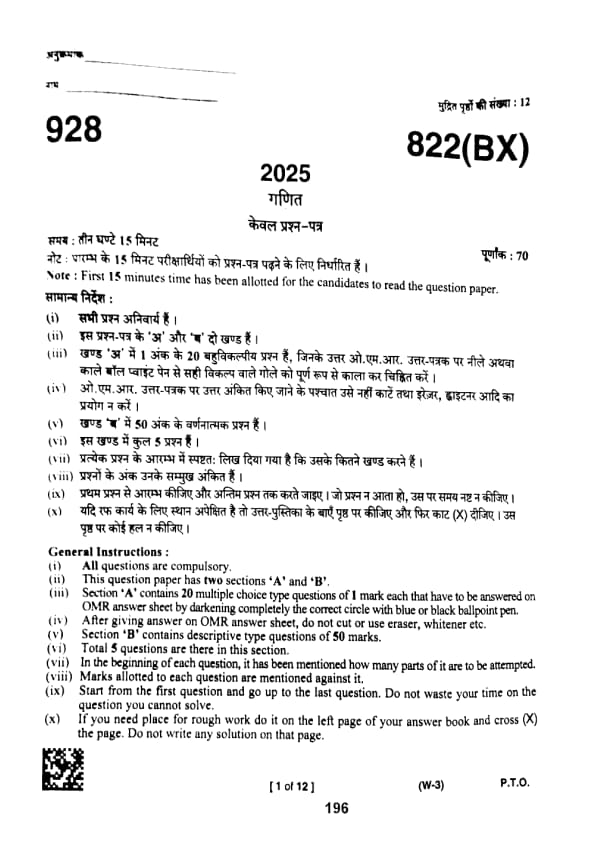
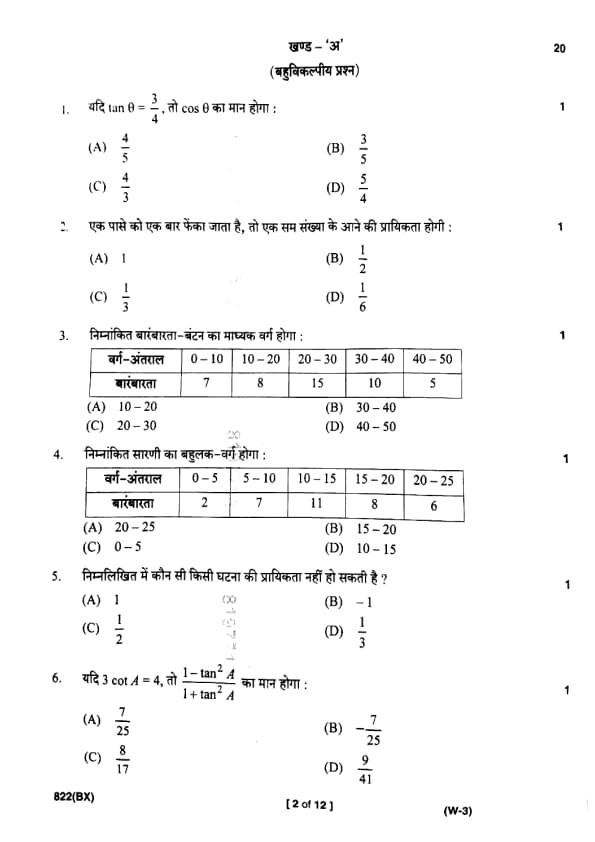
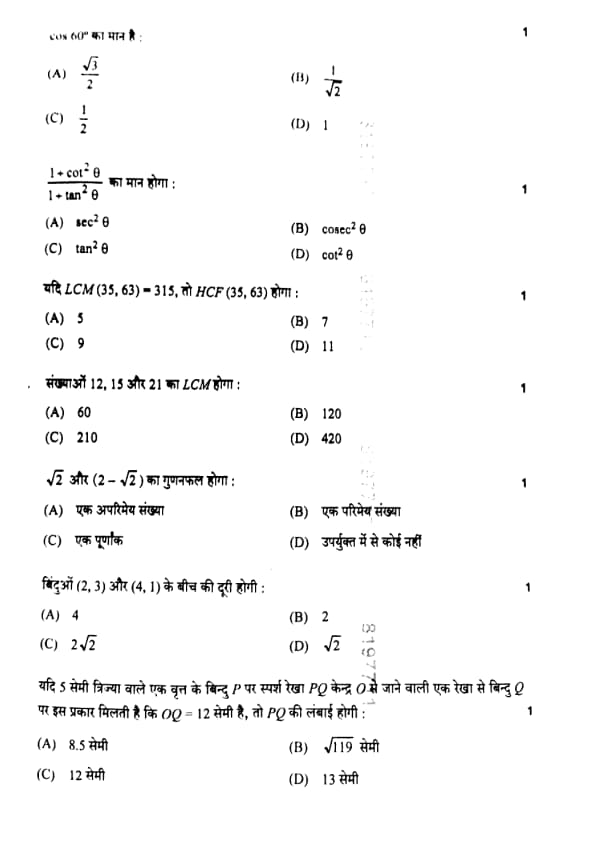
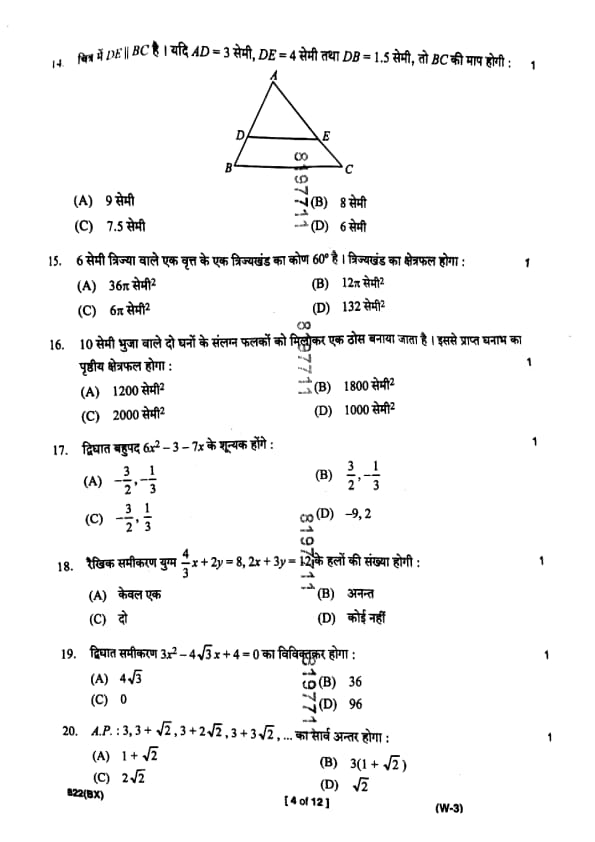
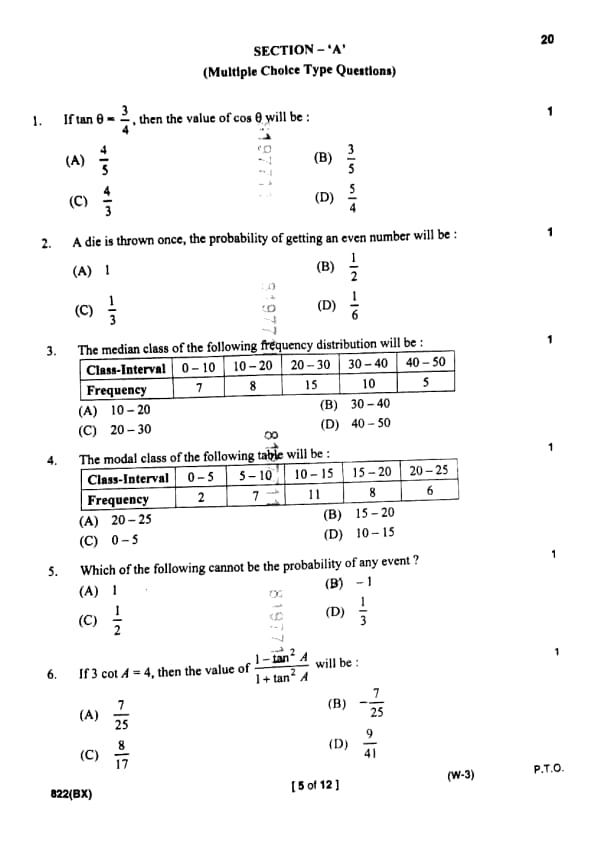
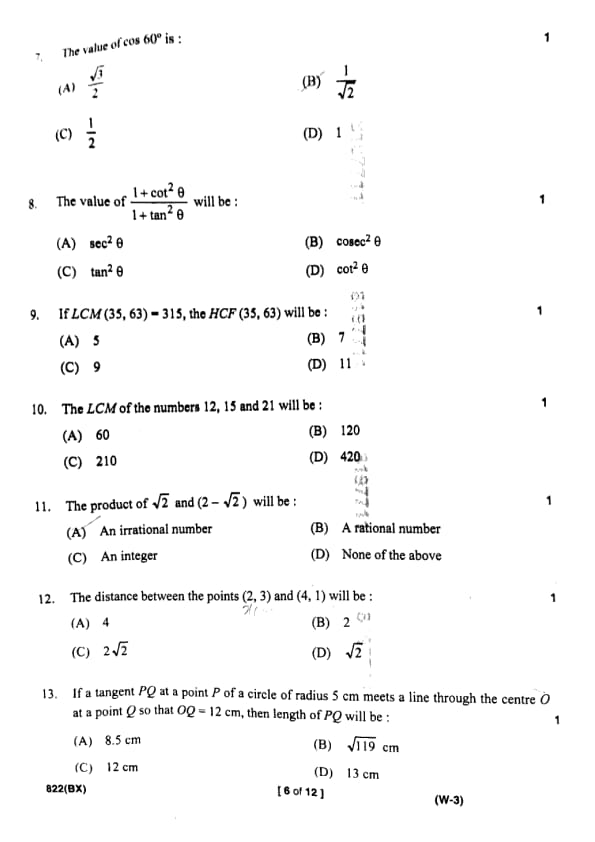
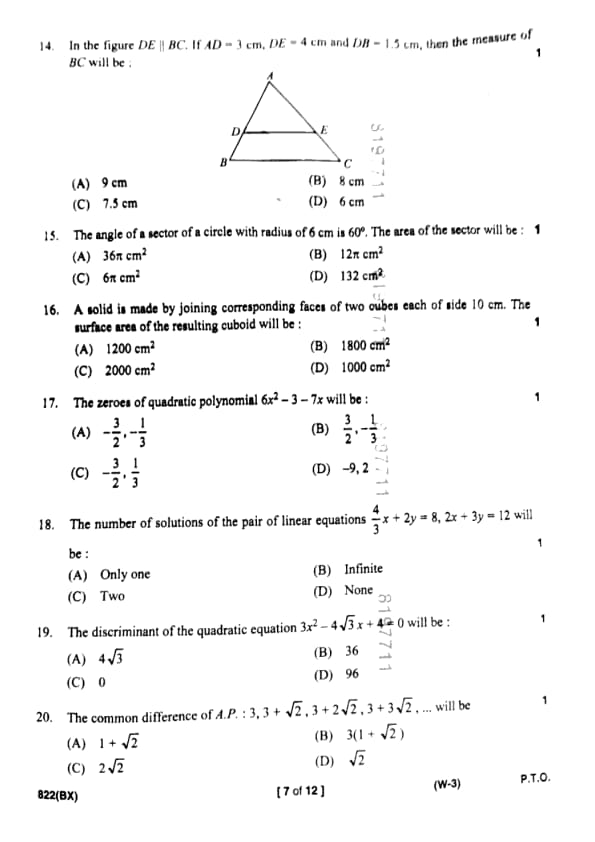
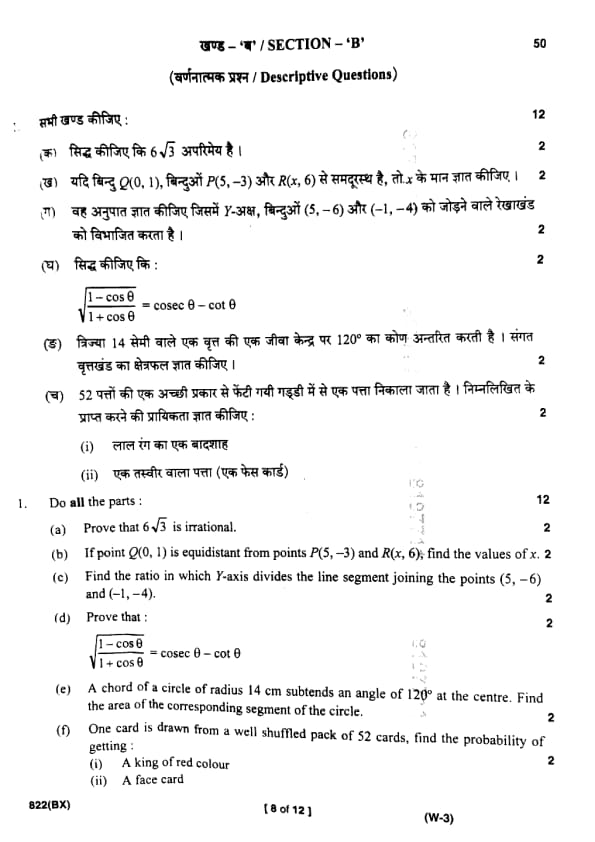
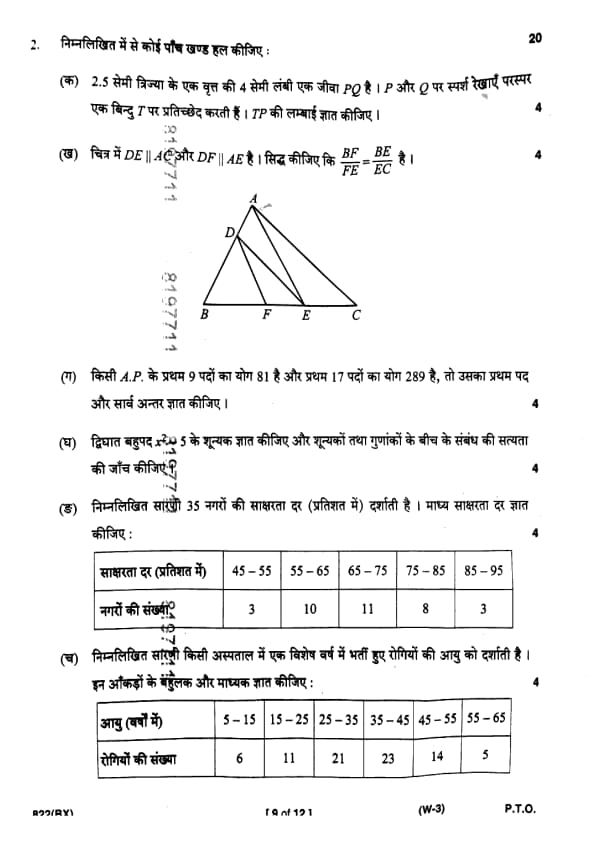
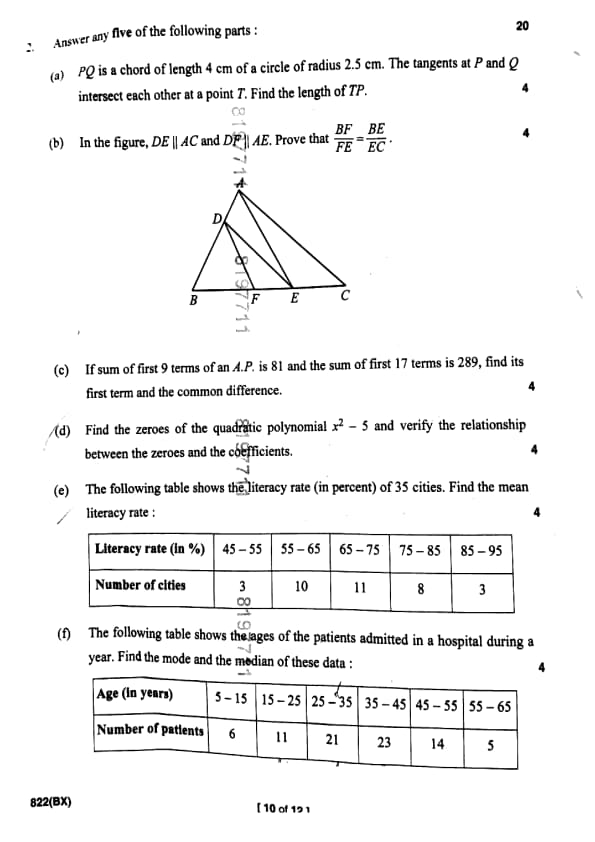
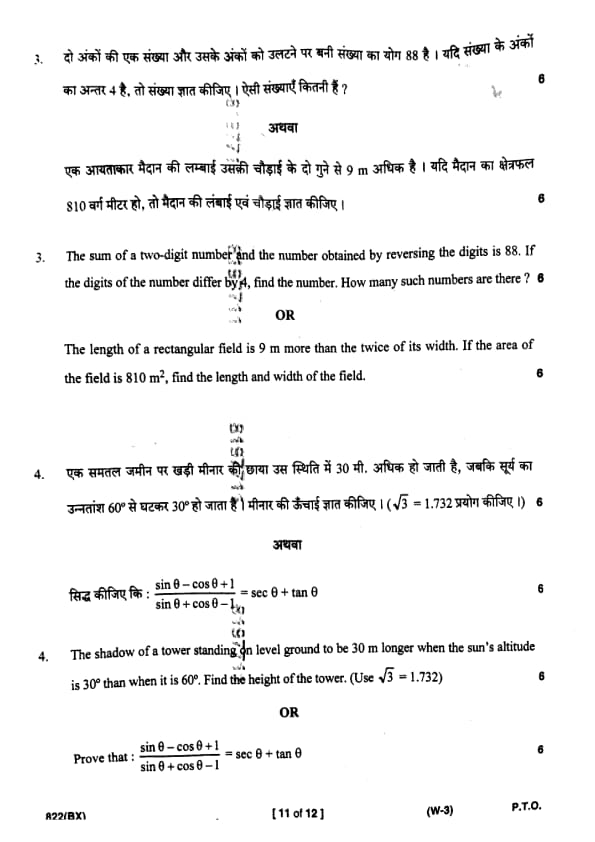
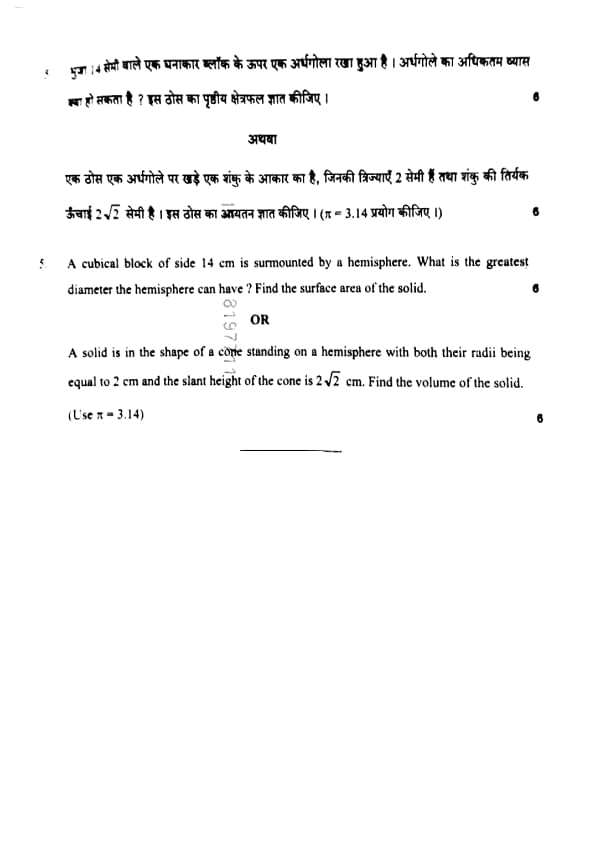



Comments